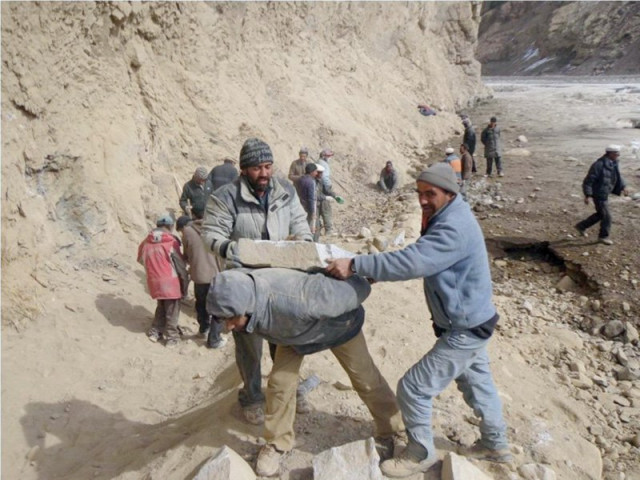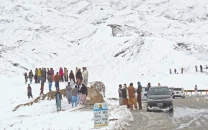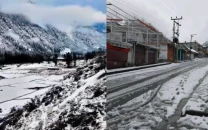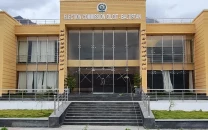Without govt aid: Shimshalis build irrigation channel on self-help basis
Years of inattention has left people to their own devices.

A group of men flatten the land, smash rocks and cut through the mountains. PHOTO COURTESY: ABDUL JOSHI
Bereft of government development schemes in the region, the people of Shimshal Valley, the last village near Pakistan’s border with China, have begun digging a water channel on self-help basis to irrigate their fields.
The canal was deemed necessary because as spring approaches, time is running out for ploughing. Government help is hard to come by in this remote valley located 300 kilometres from Gilgit, and if the channel is not built, locals might lose the season’s yield.
The building of the Korband channel began earlier this month and is being undertaken by scouts and volunteers led by Sifat Khan and Abdul Hassan, respectively.
A group of men flatten the land, smash rocks and cut through the mountains without any protective measures to pave way for the four-kilometre Korband channel in the valley which is inhabited by nearly 2,000 people.
However, this is not the first project that has been initiated and completed entirely by the locals, according to Abdul Joshi, a resident of Shimshal. “Dozens of other schemes have been completed by communities on their own,” Joshi told The Express Tribune.
Since the Gilgit-Baltistan (G-B) government has failed to address issues like load-shedding and law and order in the regional capital, Gilgit, it is least expected to do wonders for Shimshal. For this reason, the locals don’t often look to the government for help.
“Our elected representatives have failed us. We wanted our leaders to do what former chief minister Mehdi Shah did for his hometown Skardu,” said another resident.
The 55-km-long road that connects Shimshal Valley with the rest of the country tells the story of locals’ resolve; it was constructed in 2003—56 years after independence—with overwhelming support from the locals. The road, unpaved and narrow, twists through high mountains and over wooden bridges, and has reduced the duration of the journey to the valley from three days to three hours by jeep.
In Shimshal, there is no running tap water in homes and electricity is available only through solar panels the locals buy from neighbouring China. However, despite its remoteness and lack of government aid, literacy rate in the valley is 98%—almost double the national average.
Though Shimshal is one of the most remote regions of G-B, its residents are serving across the country in various fields including government service and the media. The people of Shimshal depend on tourism for income and the village has produced one mountaineer on average from every household. Renowned mountaineer Samina Baig, the first Pakistani woman to scale Mount Everest, also belongs to the valley.
According to former speaker of the G-B Legislative Assembly, Wazir Baig, the people of Shimshal are resilient and know how to meet their needs on their own. “We did try to provide relief to them during our government,” said Baig, referring to a 200-kilowatt power project which is under construction in the valley.
The first settlement in Shimshal is estimated to have arrived some 400-500 years ago when the valley was under the rule of the Mir of Hunza who sent criminals and society outcasts to Shimshal for punishment.
Published in The Express Tribune, February 20th, 2015.


















COMMENTS
Comments are moderated and generally will be posted if they are on-topic and not abusive.
For more information, please see our Comments FAQ